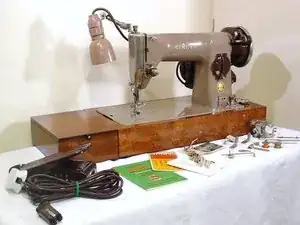Einleitung
A prerequisite for deciding on whether to repair any sewing machine is to first establish that it is in fact, actually broken!
To do this you will need to understand how the machine should normally perform when in use and its limitations when set up and operated correctly.
In the first instance the manufacturer’s user manual should be checked for operating instructions, specifications and indications of what the machine is capable of achieving.
If the machine performs as intended by the manufacturer then it does not need to be repaired.
If it doesn’t perform as intended then:
- it’s very possible that the machine has not been set up properly and/or is being operated incorrectly
- unsuitable threads or materials have been used
- incorrect needles, presser feet, bobbins, bobbin case or hook are being used
- the machine needs routine care/maintenance (cleaning, lubrication etc.)
If these factors can be ruled out then the machine is probably malfunctioning and may need servicing, adjustment or repair.
The videos hosted on the linked youtube channel:
https://www.youtube.com/channel/UCCTWl_z...
Show the normal performance of more than a hundred old and vintage sewing machine models in terms of:
- their stitch type capabilities
- their ability to sew different materials e.g. denim, sailcloth and leather
Posts in the comments section to each of these videos often provide hints and tips for repair and also links to free instruction manuals.
NOTE: These videos are not sewing machine tutorials, sewing machine tear-downs or ‘how to’ repair guides, they are merely performance bench marks for a number of old sewing machines. Sewing machines which have been fully refurbished and are working as intended.
-
-
Check to see if your machine works as intended before attempting repairs: https://www.youtube.com/channel/UCCTWl_z... There are approximately 350 videos of old sewing machines at work on this channel showing stitch types and performance when sewing denim, sailcloth and other materials
-
Many perfectly good sewing machines end up as unusable or are scrapped purely as a result of owner attempts at “repair” that are unnecessary.
-
Check out the instruction manuals below to see if your make and model are included
-
It is essential to determine whether your sewing machine actually needs to be repaired before you attempt disassembly or other repair actions.
See attached instruction manuals and links to bench mark videos for information on how your machine should work.
Many perfectly good sewing machines end up as unusable or are scrapped purely as a result of owner attempts at “repair” that are unnecessary.
Most problems that arise on domestic sewing machines - e.g. skipping stitches, puckering material, needle breakages, thread jams etc. etc. are a result of incorrect user actions.
2 Kommentare
hi, please could you tell me the model number of the Singer shown in your photograph ? Many thanks ! John
Hi, it's a Singer 215G - quite a rare model nowadays.
Regards

